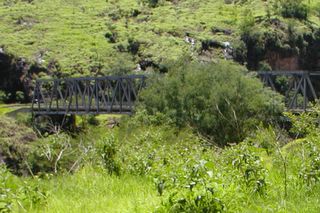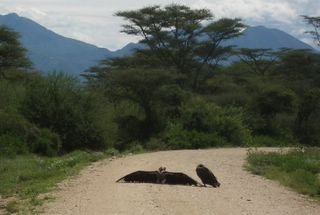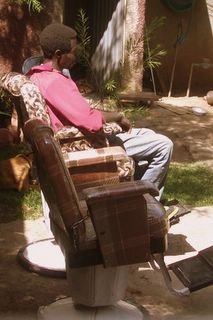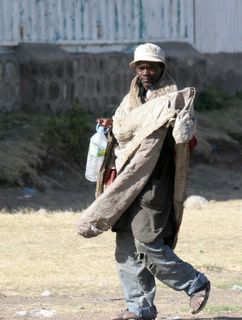12 May 06
Just after my last post, I picked up Lowell and Robin Adams, who were arriving to teach a one week training seminar on Community Health Evangelism (CHE), from Bole airport. (An aside: at one point early in the week Lowell said, "I really do believe Che was a gift from God." I burst out laughing and told him I couldn't agree more. Leftist "reds" like myself will get this - others disregard.) They served in Ethiopia for a short time as missionaries, and we quickly began to chat about life in Addis Ababa and in Ethiopia in general. To get from Bole to our destination, the new "ring road" is by far the quickest and easiest route, and I started to brag on the new road and its efficiency. "There's never
any traffic on the ring road!" Just as I pulled onto the highway, however, we came to an immediate stop. For the next 30 minutes we moved maybe 15 meters, and I kept saying things like, "I've never seen anything like this on this road."
Finally we reached the problem. The federal and city police had set up a road block and were checking each vehicle that passed through, one by one. My heart sunk; I didn't know where my license was. As the soldier approached my window, I smiled and asked what he needed. Of course, he asked for my license, to which I responded I couldn't find it, and that I thought maybe I left it in Jimma. "Big mistake," he answered. "Oh, I agree it is a big mistake - but I do have a license so its really not a problem." "No, big mistake. You, me, this car - prison." Don't get me wrong, under the right circumstances I think it would be fun to drive to the prison with my new soldier friend, probably driving in circles for awhile as he attempts to get a bribe, and finally showing up at the prison/police station a few hours later to pay the fine. Hey, in the best case scenario, I might even get held in a cell for a few hours while they call someone to come sign for me. In this case, however, I had two guests to the field in the car and didn't much like the idea of an armed soldier getting into the vehicle to drive us to prison. I asked the officer to get someone else. He said no, he is getting in the vehicle, and we are going to prison. I told him I wasn't allowed to let anyone in the car. That seemed to confuse him a bit (and rightfully so), but it delayed him so I guess it worked out alright.
He directed me to drive to the traffic circle and come back in the opposite direction, where he would get in the car. I swung around but apparently pulled into the wrong section of the highway, and he began to berate me to pull the car onto the access road. At this point, however, there was a concrete median between me and the road, and the next open section was 3km or so away. "How can I drive over there?" "Just drive over there!" "How can I drive over there?" "Just drive over there! Don't you understand me?" "No, I don't understand you. How can I drive over there?" "It's no problem! Just drive over there!" Of course I understand the officer perfectly but am looking frantically for a way to get out of this.
Did he just say no problem? I ask myself. "No problem?" this time out loud. "No problem!" I hit the gas and never looked back. "You heard him say no problem, right?" "Yeah, he definitely said 'No problem,'" Lowell laughs.
As I'm falling asleep that night, I start to think there might be a problem. I get out of bed and began to look for my Fayyaa ID card, and quickly realize its gone. During the nights events I handed the officer a copy of my passport and my ID card. He handed the passport copy back to me and my mind took that to be both documents. Personally, I would have just let the issue go, but Anbessu, the director of Fayyaa, was adamant that we get the card back. Fayyaa works closely with the government and has an excellent relationship, and Anbessu also had the worry that the police might show up in Jimma some day to pick me up. Yesterday we went to the police station and picked up the ID card. Ironically, I had to give them my license to get the ID. Today I'll go to another office to pay my fine (about $7), then show the payment receipt to the previous office to pick up the license. So, I'm back to driving without a license. Oh well.
Since then, I've hosted both the Adams and some folks from California interested in both CHE and water well drilling. In the last two weeks I've been to Awasa, Agre Salem, Arba Minch, Jinka, Salem Ber, and a host of towns and villages in and around these. I spent my birthday in a small village outside of Jinka. Glance at a map sometime - Jinka is considered the "last city in Ethiopia," and feels like an outpost of civilization. We drove through the Great Rift Valley to get there, and it would have to be one of the most desolate and harsh places I've ever seen people actually living in (except Las Vegas, but thats a bit different).
After visiting these places, there is no question (if there ever was before) that water is a significant problem throughout Ethiopia, and not only in the most publicized places such as the Kenyan border zone and the Somali zone. At this point we are trying to combine a Community Health approach with water solutions, and ideally with water solutions that can be undertaken by the community itself. In some cases the only solution is to bring in a large, expensive drilling machine. Whenever possible, however, we are trying to teach our churches that
they can solve the majority of their problems, and in many cases even their water problems. How best to integrate a massive deep water project is still in discussion, but however it is done, it cannot be done at the expense of the sustainability of the local community and congregation.
Why your sister thought I would like pink doilies I'll never know, but thank her for them all the same.
Michael


































